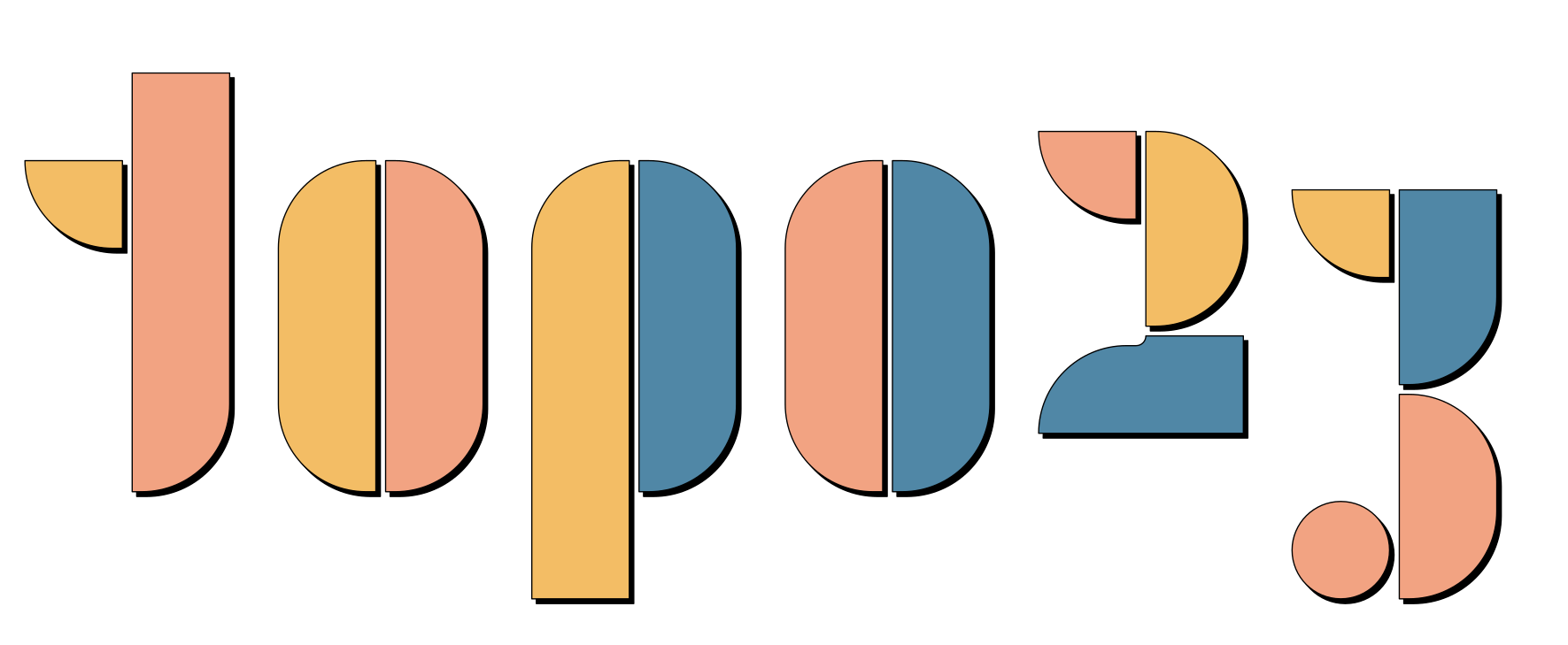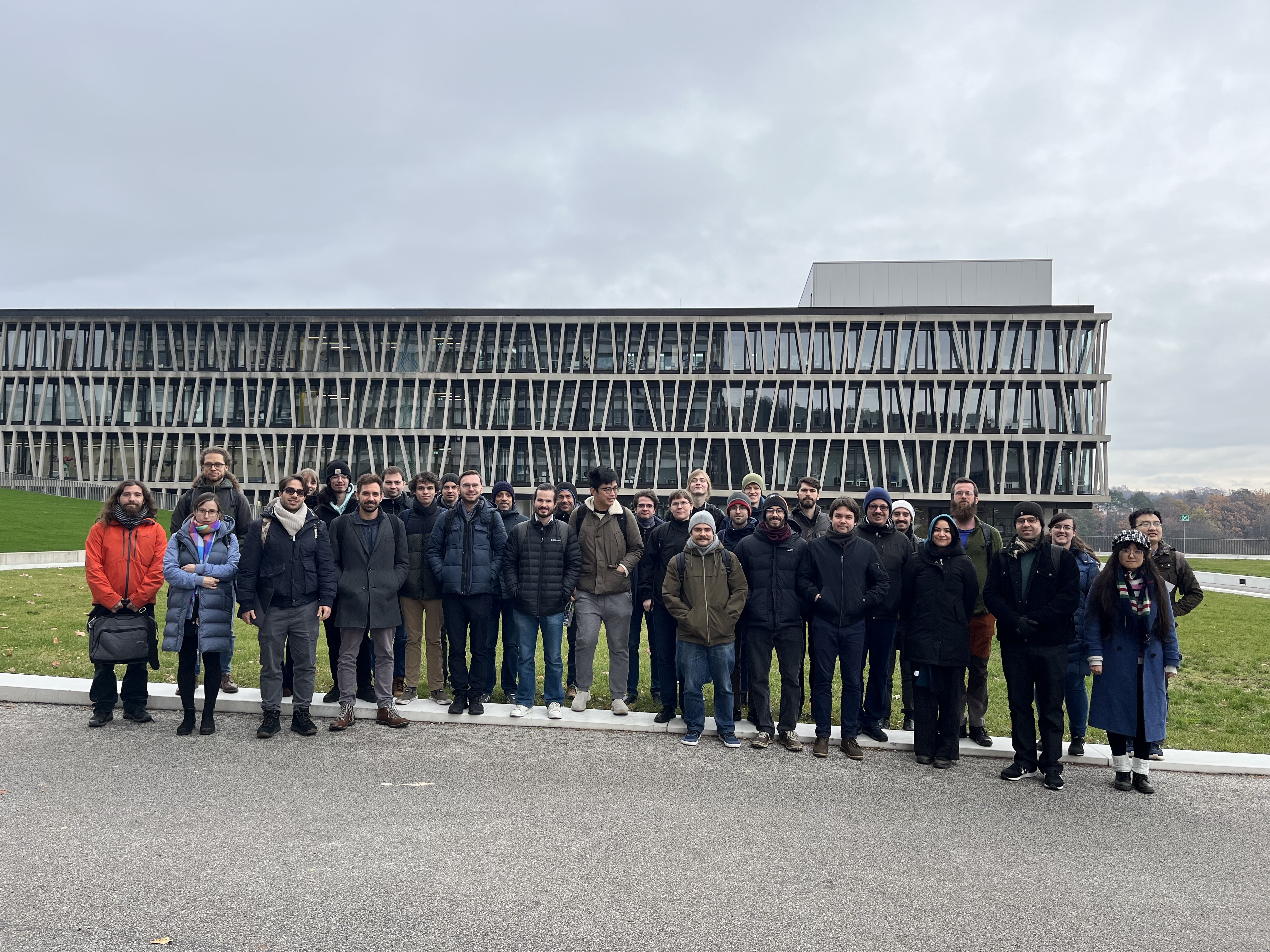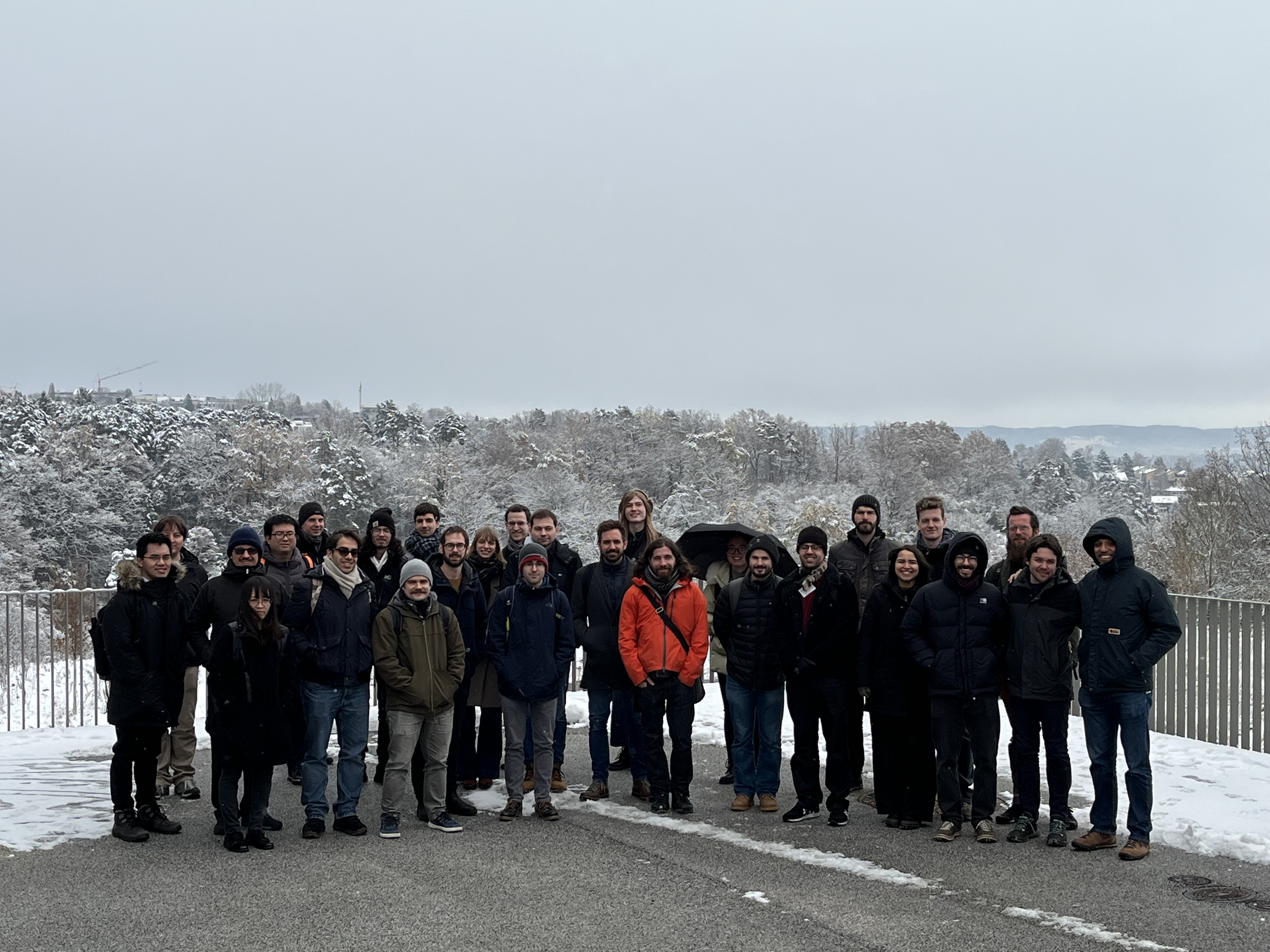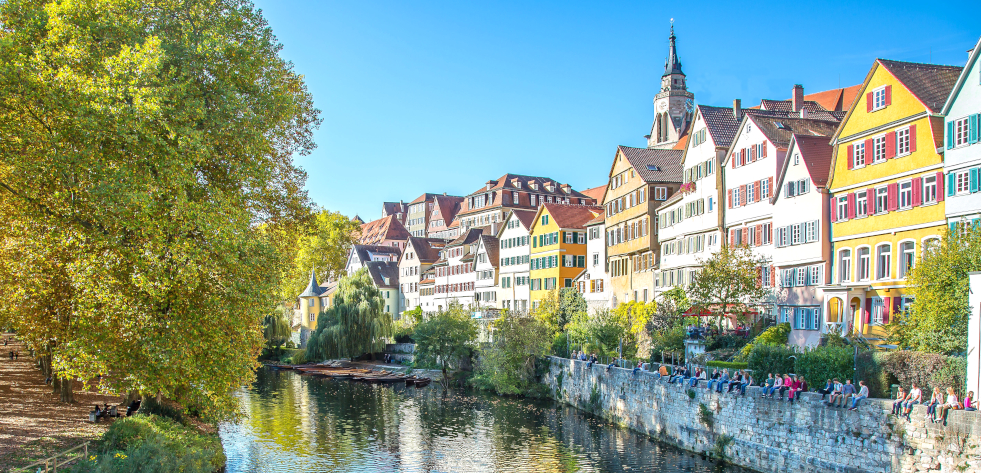A Winter Workshop
on Topological Order

Nov. 27 — Dec. 8, 2023
University of Tübingen
Topological phases have surged in the last three decades as an essential part of modern physics, thanks to remarkable breakthroughs such as the fractional quantum Hall effect, the discovery of topological insulators, or the demonstration of non-abelian exchange statistics on a quantum computer. The subject naturally bridges fields as diverse as condensed matter physics, quantum field theory, algebraic topology and quantum computation. This workshop aims to address the fundamental questions on topological order from a mathematical perspective.
The program takes place in the enchanting city of Tübingen, situated in southwestern Germany. Our facilities feature modern amenities and dedicated offices, providing also the perfect setting for individual discussions.
FIRST WEEK'S PROGRAM
| Mo. 27 | Tu. 28 | We. 29 | Th. 30 | Fr. 1 |
| Registration 9:00—10:00 |
||||
| Molnár 10:00—12:00 |
Molnár 10:00—11:00 |
Carqueville 10:00—12:00 |
Molnár 10:00—11:00 |
Molnár 10:00—11:00 |
| Carqueville 11:00—12:00 |
Carqueville 11:00—12:00 |
Carqueville 11:00—12:00 |
||
| Lunch break 12:00—14:00 |
||||
| Nielsen 14:00—15:00 |
Vidal 14:00—15:00 |
Mulevičius 14:00—14:40 |
Francuz 14:00—15:00 |
|
| Magdalena 14:40—15:20 |
||||
| Gasull 15:00—15:40 |
Pachos 15:00—16:00 |
Sommer | ||
| Xu 15:20—16:00 |
Varncraeynest | |||
| Vervoort | ||||
| ⋮ | ||||
| Dinner 19:30— |
||||
The two lectures will take place in the morning from 10:00 am to 12:00 pm and consist of five one-hour sessions. The lectures will cover the following topics:
- András Molnár (University of Vienna)
- Topological order in tensor networks: Physical and virtual symmetries.
- Nils Carqueville (University of Vienna)
- TQFTs and the connection between state sum models and string-net models.
- Recommendation: although it is not necessary, the lecturer recommends reading some definitions on category theory [PDF], these introductory lectures on topological quantum field theory [PDF, Sections 2.1, 2.2, 2.4, 3.1, 3.3], and on two-dimensional state sum models and spin structures [PDF, Section 2].
After the lunch break, a series of invited and contributed talks will take place from 2:00 pm to 4:00 pm. The speakers and potential topics are as follows (in chronological order):
- Anne Nielsen (Aarhus University)
- Adiabatic dynamics of anyons in highly excited states.
- Albert Gasull (Max Planck Institute for Quantum Optics)
- Field tensor networks in 1 and 2 dimensions.
- Julien Vidal (Sorbonne University)
- Generalized string-nets at finite-temperature. (slides)
- Jiannis Pachos (University of Leeds)
- Simulating non-Abelian statistics. (slides)
- Vincentas Mulevičius (Vilnius University)
- Internal Levin-Wen models. (slides)
- Julio Magdalena De la Fuente (Free University of Berlin)
- Bulk-to-boundary anyon fusion from microscopic models. (slides)
- Wen-Tao Xu (Technical University of Munich)
- Entanglement of Gauge Theories: from the Toric Code to the Z2 Lattice Gauge Higgs Model. (slides)
- Anna Francuz (University of Vienna)
- PEPS for numerical studies of topological order. (slides)
- Ophelia Sommer (Harvard University)
- Higher Berry curvatures in locally parameterised states. (slides)
- Bram Vancraeynest-De Cuiper (Ghent University)
- Pasting SPT phases in (1+1)d and (2+1)d lattice models. (slides)
- Kevin Vervoort (Ghent University)
- Simulating anyonic spin chains with TensorKit.jl. (slides)

SECOND WEEK'S PROGRAM
| Mo. 4 | Tu. 5 | We. 6 | Th. 7 | Fr. 8 |
| Registration 9:00—10:00 |
||||
| Lootens 10:00—11:00 |
Lootens 10:00—11:00 |
Lootens 10:00—11:00 |
Lootens 10:00—11:00 |
Lootens 10:00—11:00 |
| Verresen 11:00—12:00 |
Verresen 11:00—12:00 |
Verresen 11:00—12:00 |
Verresen 11:00—12:00 |
Verresen 11:00—12:00 |
| Lunch break 12:00—14:00 |
||||
| Wahl 14:00—15:00 |
Bols 14:00—14:40 |
Styliaris 14:00—14:40 |
Zahedi 14:00—14:40 |
|
| Gunn 14:40—15:20 |
Yang | Bello 14:40—15:20 |
||
| Lucia 15:00—16:00 |
||||
| Huang 15:20—16:00 |
Watanabe | |||
| ⋮ | ||||
| Dinner 19:30— |
Chocolate! | |||
The two lectures will take place in the morning from 10:00 am to 12:00 pm and consist of five one-hour sessions. The lectures will cover the following topics:
- Laurens Lootens (University of Cambridge)
- The categorical description of generalized symmetries and dualities on the lattice.
- Ruben Verresen (Harvard University)
- Experimental realizations.
After the lunch break, a series of invited and contributed talks will take place from 2:00 pm to 4:00 pm. The speakers and potential topics are as follows (in chronological order):
- Thorsten Wahl (University of Cambridge)
- Classifying Topological Many-Body Localized Phases. (slides)
- Angelo Lucia (Complutense University of Madrid)
- Thermalization of topological order. (slides)
- Alex Bols (ETH Zurich)
- Anyon sectors of Kitaev's quantum double model.
- David Gunn (University of Innsbruck)
- Phases of Matter under Symmetric Circuits and Symmetric Measurements.
- Rui-Zheng Huang (Ghent University)
- Emergent conformal boundaries from finite-entanglement scaling in matrix product states.
- Georgios Styliaris (Max Planck Institute for Quantum Optics)
- MPS with measurement-assisted quantum circuits: Transformations and phases of matter. (slides)
- Mingru Yang (Max Planck Institute for Quantum Optics)
- Detecting emergent symmetries at quantum criticality.
- Shayan Zahedi (Institute for Theoretical Physics - University of Cologne)
- The Topological Classification of Time Reversal Symmetric Frustrated Systems and Metamaterials. (slides)
- Miguel Bello (Max Planck Institute for Quantum Optics)
- Hermitian and Non-Hermitian Topology from Photon-Mediated Interactions.
- Yuma Watanabe (The Institute of Photonic Sciences)
- Haldane Superfluid Phase in the Multi-Band Bose-Hubbard Model.

Participants
(sorted alphabetically according to last name)
Miguel Bello
MPQ
Nov. 27 — Dec. 8
David Blanik
University of Vienna
Nov. 27 — Dec. 8
Alex Bols
ETH Zurich
Nov. 28 — Dec. 8
Ángela Capel
University of Tübingen
Nov. 27 — Dec. 8
Nils Carqueville
University of Vienna
Nov. 28 — Dec. 1
Alberto Cavallar
MPQ
Dec. 4 — Dec. 8
Boris De Vos
Ghent University
Nov. 27 — Dec. 8
Adrián Franco Rubio
MPQ
Nov. 27 — Dec. 5
Anna Francuz
University of Vienna
Nov. 27 — Dec. 1
José Garre-Rubio
University of Vienna
Nov. 27 — Dec. 8
Albert Gasull
MPQ
Nov. 27 — Dec. 5
Paul Gondolf
University of Tübingen
Nov. 27 — Dec. 8
David Gunn
University of Innsbruck
Nov. 27 — Dec. 8
Mahdie Hamdan
Cardiff University
Nov. 27 — Dec. 8
David Hofmeier
TUM
Nov. 27 — Dec. 8
Rui-Zhen Huang
Ghent University
Dec. 4 — Dec. 8
Sofyan Iblisdir
Complutense University of Madrid
Nov. 27 — Dec. 8
Xinyang Li
University of Amsterdam
Nov. 27 — Dec. 8
Laurens Lootens
University of Cambridge
Dec. 4 — Dec. 8
Angelo Lucia
Complutense University of Madrid
Nov. 27 — Dec. 8
Julio Magdalena de la Fuente
Freie Universität Berlin
Nov. 27 — Dec. 1
Tadahiro Miyao
Hokkaido University
Nov. 27 — Dec. 8
András Molnár
University of Vienna
Nov. 27 — Dec. 8
Vincentas Mulevičius
Vilnius University
Nov. 25 — Dec. 1
Anne Nielsen
Aarhus University
Nov. 27 — Dec. 1
Jiannis K. Pachos
University of Leeds
Nov. 27 — Dec. 8
Anastasios Papadopoulos
University of Tübingen
Nov. 27 — Dec. 8
Anna Ritz-Zwilling
LPTMC, Sorbonne University
Nov. 28 — Dec. 8
Carla Rubiliani
University of Tübingen
Nov. 27 — Dec. 8
Alberto Ruiz-de-Alarcón
University of Tübingen
Nov. 27 — Dec. 8
Georgios Styliaris
MPQ
Dec. 4 — Dec. 8
Oliver Siebert
University of Tübingen
Nov. 27 — Dec. 8
Ophelia Sommer
Harvard University
Nov. 27 — Dec. 8
Xiaoqi Sun
MPQ
Nov. 27 — Dec. 1
Stefan Teufel
University of Tübingen
Nov. 27 — Dec. 8
Erickson Tjoa
MPQ
Dec. 4 — Dec. 8
Sabiha Tokus
University of Tübingen
Nov. 27 — Dec. 8
Bram Vancraeynest-De Cuiper
Ghent University
Nov 27 — Dec. 1
Ruben Verresen
Harvard University
Dec. 4 — Dec. 8
Kevin Vervoort
Ghent University
Nov. 28 — Dec. 1
Julien Vidal
Sorbonne University
Nov. 27 — Dec. 1
Thorsten Wahl
University of Cambridge
Dec. 4 — Dec. 8
Yuma Watanabe
ICFO
Nov. 27 — Dec. 8
Marius Wesle
University of Tübingen
Nov. 27 — Dec. 8
Tom Wessel
University of Tübingen
Nov. 27 — Dec. 8
Wen-Tao Xu
TUM
Nov. 27 — Dec. 1
Mingru Yang
MPQ
Nov. 27 — Dec. 8
Shayan Zahedi
THP University of Cologne
Nov. 27 — Dec. 8
Organizing committee
The organizing committee of this workshop is composed of
- José Garre-Rubio (University of Vienna),
- Sofyan Iblisdir (Complutense University of Madrid),
- Alberto Ruiz-de-Alarcón (University of Tübingen).
You can reach us at the following email address:

Venue
Tübingen is an enchanting city located in the southwest of Germany, well-known for its rich history and as the home of one of the oldest universities in Europe. It was founded in the 12th century and features a charming old town filled with medieval buildings, cobblestone streets and lovely squares.
The workshop will take place at the Room N14 of the Faculty of Mathematics (C-Bau) (Maps) at the Morgenstelle Campus, situated in the northwest of the city. It can be conveniently reached from the city center using public transportation. The campus offers numerous opportunities, including access to modern facilities for discussions and the nearby Mensa Canteen (Maps).
How to arrive
If you plan to travel by air, the nearest airport to Tübingen is Stuttgart Airport (STR). Upon arrival, you can conveniently reach the city center of Tübingen by boarding buses X82 or 828 (Maps), which provide direct transportation.
When traveling by train, Tübingen offers its own train station called Tübingen Hauptbahnhof (Maps). Situated in the heart of the city, this station provides convenient connections to various cities in Germany and Europe.
Once you are in the city, it should not be difficult to find a direct bus route from your accomodation to the Faculty of Mathematics via the bus stop BG Unfallklinik (Maps) or Auf der Morgenstelle (Maps). In general, buses 5, 13, X15, 18 and 19 should work. You can also look for a route from your location using e.g. Google Maps or the official app Naldo (website, iOS, Android), or find the timetables here.
However, if you are finding it difficult, feel free to contact us by email and we will find the best route to and from your hotel to the faculty.